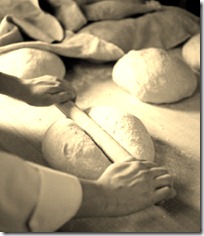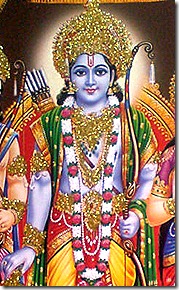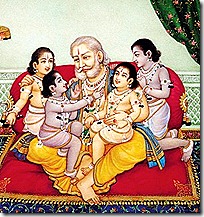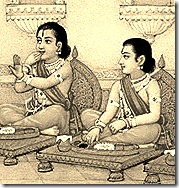 “O
Prabhu, you fulfill all desires and give the four fruits of existence.
Understanding that, I am fearful of what I could possibly give to you.”
(Janaki Mangala, 22)
“O
Prabhu, you fulfill all desires and give the four fruits of existence.
Understanding that, I am fearful of what I could possibly give to you.”
(Janaki Mangala, 22)tumha prabhu pūrana kāma cāri phaladāyaka |
tehiṃ teṃ būjhata kāju ḍarau munidāyaka ||
The pious king knew that the exalted guest kindly received at his home came to ask for something. He wasn’t a resident of Ayodhya, so his visit had a purpose. For the king, there wasn’t much to give in comparison to what the sage could bestow. From proper wisdom comes the attainment of life’s ultimate goal, which automatically incorporates the four primary rewards that are delineated by the Vedas. The ancient scriptures of India identify the four primary rewards and go about describing how they can be achieved, and the lessons imparted are not bound by sectarian designations or specific time and circumstance. In the same way, the counsel and association of the saintly class is not restricted to any group. Just hearing about these saints many years later can provide so many benefits.
Why was this guest so exalted? How could he fulfill all desires? The plants in the garden produce fruits that can be consumed. The same goes for the farm in general, which produces the food that sustains life. In one sense, you could consider the plant to be a wish-fulfilling tree which grants our desires in life. Whatever it is we may want, it can’t be achieved unless there is vibrancy in life. The vital force within the body is maintained by food; therefore the plants serve as the sustenance, the source of the boons that life can grant us.
If someone were to give us land and the ability to grow crops, that reward would be greater than anything else offered. Someone may give us money or good fortune that is temporary in its manifestation, but the resulting benefits will be targeted. Getting the source of all enjoyment is more important, because from that source there are endless possibilities for rewards. Another way to think of it is to compare a prepared food dish to the actual raw ingredients. The dish can be enjoyed by those who have a taste for it, while the ingredients can be used to prepare many other dishes. Hence the possession of the ingredients is more valuable.
 In
the playing field of the material world, there are endless avenues for
activity, with some leading to better conditions and others leading to
worse ones. The Vedas declare that the human form of body is the most
auspicious because of the potential it brings for achieving the four
fruits in life: dharma, artha, kama and moksha.
Dharma is religiosity, which immediately signals a departure from the
animal species. Following regulative principles is only possible in a
civilized society. From abiding by religious principles you get artha,
or economic development. Without a profitable end to your ventures,
what will you have to show for your work? Economic development affords
the opportunity for kama, or sense gratification. And finally, after a life filled with enjoyment of the three rewards, there is the ideal boon of moksha, or salvation. Follow religious principles, profit in your work, enjoy the rewards, and then never repeat the same cycle again.
In
the playing field of the material world, there are endless avenues for
activity, with some leading to better conditions and others leading to
worse ones. The Vedas declare that the human form of body is the most
auspicious because of the potential it brings for achieving the four
fruits in life: dharma, artha, kama and moksha.
Dharma is religiosity, which immediately signals a departure from the
animal species. Following regulative principles is only possible in a
civilized society. From abiding by religious principles you get artha,
or economic development. Without a profitable end to your ventures,
what will you have to show for your work? Economic development affords
the opportunity for kama, or sense gratification. And finally, after a life filled with enjoyment of the three rewards, there is the ideal boon of moksha, or salvation. Follow religious principles, profit in your work, enjoy the rewards, and then never repeat the same cycle again.The brahmanas, or priests, can grant these four rewards through their association. Not to be confused with magic genies who suddenly arrive on the scene and give you what you want, the saints provide instruction so that mankind can follow the proper set of activities that will bring those rewards through work. Dharma, artha, kama and moksha apply to every single human being, regardless of religious persuasion or interest in spiritual life. Indeed, by following the guidelines laid down by the brahmanas, one doesn’t even need to know what the four rewards are or why they are worth attaining.
The spirit soul is the actor and the material bodies the playing field. The material elements as a whole can be considered the field as well, and with proper knowledge one will know how to succeed on that field. As the brahmanas provide this knowledge through their instruction, the value of their association can never be properly estimated. Whatever reward it is you want, whatever fruit you would like to enjoy from the tree of life, the Vedas provide the answer. Though the highest reward is to voluntarily escape from the playing field and find the constitutional engagement of loving service to God, the enjoyments derived from a material existence are not denied the follower of the Vedas.
 Maharaja
Dasharatha had only desires for divine association. His eldest son was
an incarnation of the original person, the Supreme Personality of
Godhead. Therefore the king was already living in the spiritual world,
basking in the sweet vision of Shri Rama day after day. From that love
for Godhead sprung natural affection for those who represent the Lord’s
interests on earth, the brahmanas. Already taking care of and respecting
many priests in his own kingdom, Dasharatha one day had the good
fortune of being visited by Vishvamitra Muni.
Maharaja
Dasharatha had only desires for divine association. His eldest son was
an incarnation of the original person, the Supreme Personality of
Godhead. Therefore the king was already living in the spiritual world,
basking in the sweet vision of Shri Rama day after day. From that love
for Godhead sprung natural affection for those who represent the Lord’s
interests on earth, the brahmanas. Already taking care of and respecting
many priests in his own kingdom, Dasharatha one day had the good
fortune of being visited by Vishvamitra Muni.After properly receiving his guest and getting his blessing, the king prepared for what the muni might ask. In the above referenced verse from the Janaki Mangala, the king offers the highest praise to Vishvamitra. The muni is addressed here as Prabhu, which means “lord”, and is praised for being able to grant any desire, including the four fruits of existence. One who attains dharma, artha, kama and moksha in a single lifetime is considered extremely fortunate, as the rewards don’t cohabitate very well with each other. Too much religiosity dampens the urge for sense gratification, and too much economic success makes following religious principles more difficult. In addition, if I am addicted to sense gratification, how will I get release from the cycle of birth and death? Moksha is specifically hinged on desire, what the consciousness is focused on at the time of death.
The association of the brahmanas thus becomes very important. They can put the proper guidelines into place, where the four rewards can cohabitate without a problem. Almost thinking out loud, Dasharatha here remarks how he feels that he can’t give the muni a proper gift. If someone gives you the four fruits of existence, what could you possibly give them In return? Ah, but Dasharatha did have something that any person would desire: God’s personal association. Vishvamitra had come to ask for this, the king’s most valuable possession.
What would you do in the same situation? Someone comes by your home to borrow the services of your son, who happens to be an expert bow warrior, though still of a young age. This son is your most cherished object; his vision every day makes your life worth living. You had gone many years without having children, and you fretted over whether or not the family line would continue. Only after having completed an important yajna, or sacrifice, did not only one, but four beautiful sons come your way. Now someone who doesn’t live in your community wants to take your eldest son? Why would you agree?
 The
reason for Dasharatha’s eventual acquiescence is revealed in the above
referenced statement. As the brahmanas provide the most valuable
information in life, their requests cannot be denied. Indeed, it was the
brahmana class who had urged Dasharatha to perform the sacrifice that
brought Shri Rama to his family. The ways of the Lord are so mysterious
and perfect at the same time. Though God is never influenced by external
action, He arranges events in such a way so that it looks like a
specific behavior leads to His presence. It was a fact that Rama had
desired to appear as Dasharatha’s son a while back and that the advice
of the brahmanas was given to increase the value of their association,
to show how much respect they deserve.
The
reason for Dasharatha’s eventual acquiescence is revealed in the above
referenced statement. As the brahmanas provide the most valuable
information in life, their requests cannot be denied. Indeed, it was the
brahmana class who had urged Dasharatha to perform the sacrifice that
brought Shri Rama to his family. The ways of the Lord are so mysterious
and perfect at the same time. Though God is never influenced by external
action, He arranges events in such a way so that it looks like a
specific behavior leads to His presence. It was a fact that Rama had
desired to appear as Dasharatha’s son a while back and that the advice
of the brahmanas was given to increase the value of their association,
to show how much respect they deserve.Lord Rama and His younger brother Lakshmana would be the reward for Vishvamitra’s graceful presence. Of course the exchange was not an even one, for the four fruits of existence cannot compare to the presence of Rama and Lakshmana. The two beautiful youths are splendid in their appearance, dedicated in their vow to protect, and most sincere in their efforts. Just being able to say the names of the two brothers is a boon that brings many auspicious merits. Vishvamitra didn’t ask for Rama’s protection as a means of getting even. He was having difficulty living peacefully in the forests, as the night-rangers had harassed many innocent sages. The brahmanas unable to carry out their religious duties, their protector, brahmanya-devaya, Shri Rama, would go to the forests and weed out the toxic influence of the ghoulish enemies of the saintly class.
 By
following the regulations advised by the brahmanas, the four fruits of
existence can come to us, but this path is very difficult. On the other
hand, through following the recommendation of pure devotion to the
Supreme Lord, the four rewards become insignificant. Dasharatha felt
like his life was taken away whenever he was separated from Rama, which
shows just how cherished God’s association is. As the holy name is the
best way to connect with that sweetheart who roamed the forests as a
young child protecting Vishvamitra, the most recommended practice for
spiritual upliftment is the chanting of the holy names, “Hare Krishna Hare Krishna, Krishna Krishna, Hare Hare, Hare Rama Hare Rama, Rama Rama, Hare Hare”.
The acharyas of the Vedic tradition have done so much for us that we
really have no way of repaying them. Through dedication in bhakti-yoga,
or devotional service,
we honor their efforts and hopefully please them. The benedictions
offered by the saints are meant to culminate in spontaneous devotion to
God, so if we take up the processes of bhakti right away, their past
tireless efforts will prove to be fruitful for us.
By
following the regulations advised by the brahmanas, the four fruits of
existence can come to us, but this path is very difficult. On the other
hand, through following the recommendation of pure devotion to the
Supreme Lord, the four rewards become insignificant. Dasharatha felt
like his life was taken away whenever he was separated from Rama, which
shows just how cherished God’s association is. As the holy name is the
best way to connect with that sweetheart who roamed the forests as a
young child protecting Vishvamitra, the most recommended practice for
spiritual upliftment is the chanting of the holy names, “Hare Krishna Hare Krishna, Krishna Krishna, Hare Hare, Hare Rama Hare Rama, Rama Rama, Hare Hare”.
The acharyas of the Vedic tradition have done so much for us that we
really have no way of repaying them. Through dedication in bhakti-yoga,
or devotional service,
we honor their efforts and hopefully please them. The benedictions
offered by the saints are meant to culminate in spontaneous devotion to
God, so if we take up the processes of bhakti right away, their past
tireless efforts will prove to be fruitful for us.In Closing:
Four fruits of existence brahmanas give,
So that pursuing proper path you can live.
Follow dharma to get economic development,
Satisfy senses and hope rebirth to circumvent.
King meeting Vishvamitra felt hesitant,
For vipra can provide of desires attainment.
What possibly could king give in return,
Nothing of equal value was cause for concern.
King’s eldest son Rama of existence its source,
Chanting His name is life’s proper course.
To part with his son king did finally agree,
From Vishvamitra’s request, sages God to see.
No comments:
Post a Comment